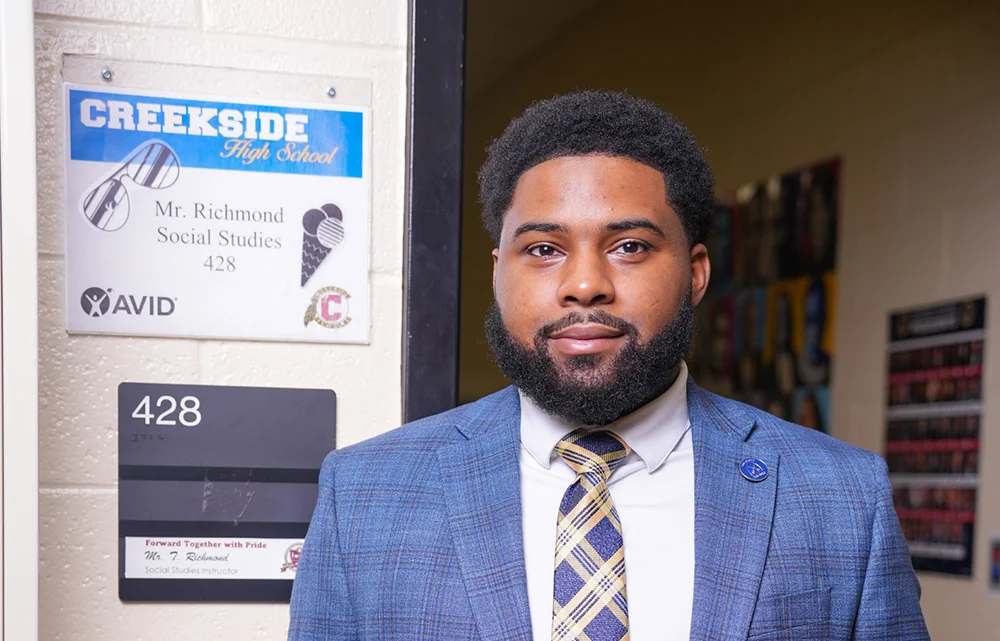Mentor Spotlight: Timothy Richmond
For Timothy Richmond, the best thing about being a Youth Villages mentor is learning something new from each young person he takes under his wing.
And in the process, he learns more about himself.
“The biggest thing I learned about myself is we shouldn’t take for granted the impact we have on people,” he said. “Even if we consider it to be something so small. The small things we do really can be quite impactful on the trajectory of people’s lives and what they experience, so it is important to be really cognizant of that.”
January is designated as National Mentoring Month, a time to recognize the life-changing work done by mentors such as Timothy, while also spotlighting how members of the community can get involved with Youth Villages’ mentoring program in Georgia.
“Launched in 2002, the month represents a time for Americans to celebrate the power of relationships, drive meaningful change and expand quality mentoring opportunities for the nation’s youth,” according to mentoring.com.
Timothy, an AP African-American studies and U.S. history teacher with Fulton County Schools in metro Atlanta has been a part of Youth Villages’ Chris Crye Mentoring Program in Georgia since he was a student at Atlanta’s Emory University.
Joining the program in 2019, he has mentored eight young people ranging from ages 9 to 18.
“To me, that connection I foster with people, I get satisfaction from that,” he said. “I would say it’s motivating, and it also brings hope. You just have to immerse yourself in the experience and be willing to learn and not be afraid of failure.”
Mentoring Power
Research has proven that children with at least one compassionate, steady adult in their lives are less likely to drop out of school, have fewer run-ins with law enforcement and forge better relationships with their families. That is the role that Youth Villages mentors play.
“Our mentors are instrumental in providing and modeling healthy relationships for young people who’ve been missing that for a while,” said Tanya Anderson, executive director for Youth Villages Georgia. “More than 70% of the young people we’re serving have come out of the foster care system and they have not had long-standing healthy relationships with individuals they can count on, and mentors really serve that void.”
Mentoring can also help young people boost their confidence and self-esteem, decrease their chances of addiction, improve behavior at home and school and increase their chances of enrolling in college.
When it comes to being a mentor, consistency is the key, according to Katrina Word, mentoring supervisor for Youth Villages Georgia.
“You don’t need to have a background in mental healthcare to be a mentor; you just have to show up for our youth,” Katrina said. “We’re not asking our mentors to do anything specific for their mentees, we’re just asking them to be consistent, supportive and encourage them.”
Of course, Youth Villages mentors do receive initial training and have guidelines, but ultimately the approach they take with their mentees is flexible.
Timothy, who is 27, likes to break the ice with his mentees by using humor.
“I really try to be funny because it’s like this: The running thing with my [school] students too is that I’m corny and I make Dad jokes even though I don’t have any children of my own,” he said. “We usually have this sheet of questions where we ask what [our mentee’s] favorite things are and it’s the perfect time to sneak in jokes as well. But it’s very informal, basic information we’re trying to find out about each other.”
He approaches each mentee with an open mind and encourages them to share what they want to share with him, to find out what they like and who they are, to foster an environment of mutual trust and respect.
“I think the reason why Timothy is such a successful mentor is he listens,” Katrina said. “He is the most non-judgmental person you will ever meet.”
Stepping Up
Timothy counts being a Youth Villages mentor as one of the most meaningful journeys he has undertaken, and encourages his friends, who are also in their 20s, to also become mentors.
“When I talk about it with my friends, I relay that this is one of the best experiences I’ve ever embarked on, so I definitely want them to have this experience too,” he said.
Youth Villages mentors engage their mentees with activities many of us might take for granted, like going shopping, attending a ballgame, taking them fishing or hiking, or seeing a movie at a theater – letting kids be kids.
To volunteer as a Youth Villages mentor, applicants must pass a mandatory screening, be at least 21 years old, commit to spending four-to-six hours per month one-on-one with a mentee and attend an initial training session.
While there is a demand for new mentoring recruits for Georgia across all demographics, Katrina said there is a specific need for mentors from metro Atlanta’s LGBTQ+ (lesbian, gay, bisexual, transgender, queer/questioning) communities.
In addition to the initial training, Youth Villages mentors receive ongoing support from the program facilitators, access to mentor/mentee group activities, complimentary tickets to community events when available and tax deductions for their mentoring expenses, such as mileage.
“Mentors are always appreciated, always needed and it’s great when you have individuals who are willing to give back in that way,” Tanya said.
To learn more and get involved in the program, go to www.youthvillages.org/mentoring.

